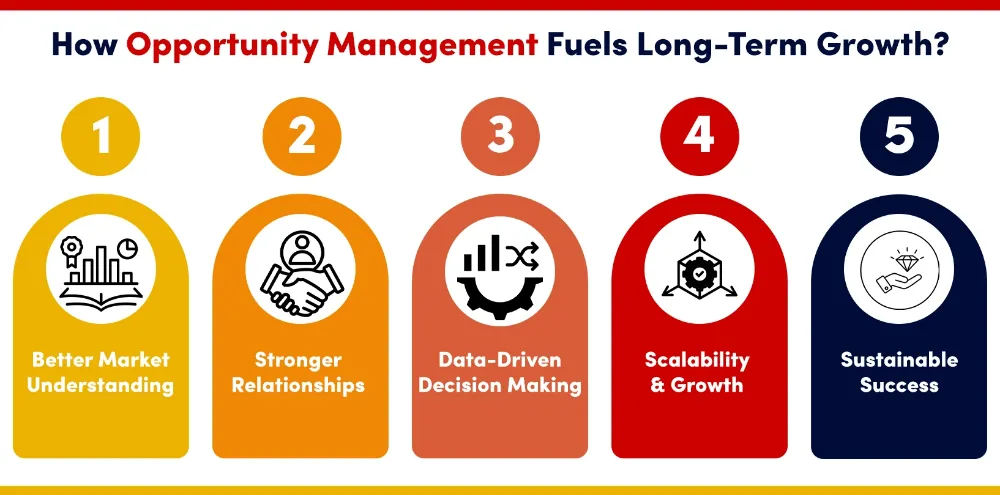
Sales are more than the numbers, products, or pitches, and these are opportunities. Every conversation, every inquiry, every handshake is a potential door to revenue. Yet, many businesses miss these doors simply because they fail to manage opportunities effectively. Opportunity management is not a buzzword, but the bridge between an interested prospect and a closed deal.
Let’s explore why opportunity management plays such a crucial role in driving consistent sales success and how mastering it can turn a struggling pipeline into a thriving engine of growth.
What Exactly is Opportunity Management?
Before we dive deeper, let’s get the basics clear. Opportunity management is managing potential sales opportunities as they move through the pipeline. It starts the moment a lead shows genuine interest in your product or service and continues until the deal is either won or lost.
At its core, it is about visibility and control. It gives salespeople a complete view of who their prospects are, where they are in the buying process, and what actions are needed next to move the deal forward.
Think of it as the art of staying one step ahead.
Building the Foundation for Predictable Sales
Every sales leader dreams of predictable revenue. That predictability does not come from luck—it comes from managing opportunities consistently. When opportunities are tracked, categorized, and evaluated properly, patterns begin to emerge.
You start to see what type of opportunities close faster, which industries respond better, and which stages tend to get stuck. This insight becomes your guide for forecasting and planning.
A well-managed opportunity pipeline allows managers to make informed decisions about targets, resources, and timelines. It eliminates guesswork and brings discipline into sales planning.
Without opportunity management, forecasting becomes a wishful thinking. With it, sales become a science.
Why Most Sales Teams Struggle Without It
Many organizations attract leads but often see them fall through the cracks. Why? Because there is no structured way to manage opportunities once they enter the pipeline.
Here’s what usually happens:
- Reps rely on memory or manual spreadsheets.
- Follow-ups are delayed or missed.
- Communication with prospects is inconsistent.
- Teams have no visibility into which deals are progressing or stalling.
- Managers cannot identify problems until it is too late.
The Core Benefits of Opportunity Management

Now let’s dive into what makes opportunity management such a powerful strategy for sales success.
1. Improved Visibility Across the Sales Cycle
Opportunity management gives every member of the sales team a clear picture of what is happening in the pipeline. Managers can see which opportunities are close to closing and which ones need attention. Sales reps can prioritize their day based on where their time will have the most impact.
2. Better Collaboration Among Teams
When opportunities are tracked in a centralized system, multiple teams can collaborate seamlessly. Marketing can see which campaigns generate the most qualified opportunities. Customer success can be prepared in advance for new clients. Everyone works together, creating a smoother customer journey from the first interaction to post-sale engagement.
3. Accurate Forecasting and Planning
Forecasting is one of the most challenging tasks for sales leaders. Without proper opportunity tracking, forecasts are based on assumptions. But with a structured approach, forecasting becomes more accurate and reliable.
Opportunity management allows you to analyze conversion rates, deal durations, and closing probabilities.
4. Faster Decision Making
Opportunity management ensures that your team has real-time access to crucial information. Reps can see which prospects are ready to move forward and respond immediately.
5. Higher Conversion Rates
When your team manages opportunities strategically, every stage of the sales process becomes more efficient. Sales representatives know when to follow up, what to say, and how to personalize their approach based on each prospect’s needs.
This level of focus and personalization naturally leads to higher conversion rates. Opportunities are nurtured with care and closed with confidence.
6. Smarter Resource Allocation
Not all opportunities are created equally. Opportunity management helps you identify which deals deserve more attention and which ones can wait.
By focusing your best efforts on high-potential opportunities, you make better use of your time and resources. It also prevents burnout by eliminating wasted effort on low-value prospects.
The Role of Technology in Opportunity Management
While opportunity management is a mindset, technology makes it scalable. The CRM system is a foundation for effective opportunity management.
It automates tracking, sends reminders for follow-ups, and provides dashboards that show the health of your pipeline at a glance. With a good CRM, your team can access information anytime, anywhere.
When sales teams embrace the habit of updating and reviewing opportunities regularly, the system becomes a living reflection of your sales reality.
Building a Culture of Opportunity Management
Opportunity management is not just a process; it is a culture that needs to be built from the top down. Leadership must champion it, managers must enforce it, and sales reps must live it daily.
Here’s how to build that culture:
- Lead by Example: Managers should use the same system and follow the same process as their teams. When leaders practice what they preach, adoption increases naturally.
- Train Continuously: Opportunity management is a skill that improves with practice. Regular training sessions help teams stay sharp and consistent.
- Celebrate Wins: Recognize reps who manage their opportunities well and close deals through disciplined tracking.
- Keep It Simple: Avoid overcomplicating the process. The simpler and clearer it is, the more likely your team will embrace it.
From Leads to Lifelong Customers
When opportunity management is executed effectively, the journey does not end with a closed deal. It sets the stage for a lasting relationship.
The insights gained during the sales process can guide post-sale engagement. You already know what the customer values, what problems they face, and how they prefer to communicate. This knowledge helps your support and account management teams deliver exceptional experiences that keep customers coming back.
Bringing It All Together
Opportunity management is the backbone of successful sales. It brings structure to the unpredictable, clarity to the complex, and focus to the fast-paced world of selling.
When your team masters it, every opportunity becomes a chance to grow revenue, build relationships, and strengthen your brand’s reputation.
It is not about adding more tools or processes—it is about changing the way you see opportunities. Instead of treating them as fleeting moments, you treat them as valuable assets that deserve attention and care.
With disciplined opportunity management, your sales team no longer chases deals—they guide them. They do not wait for success—they create it.
Try LionO360 Smart CRM for Smarter Opportunity Management

The Opportunity Management system powered by LionOBytes India helps you turn every conversation into a chance for success and every opportunity into a measurable win.
Sales success does not happen by accident. It happens when every opportunity is managed with precision, purpose, and passion.
So, if you want your business to thrive, start by managing your opportunities. Because when you master that, everything else in sales falls beautifully into place. Schedule your free CRM demo now and get the best deal!
Frequently Asked Questions
What exactly is Opportunity Management?
Opportunity management is the process of managing potential sales opportunities as they move through your sales pipeline. It begins when a lead shows genuine interest and continues until the deal is either won or lost. Its core purpose is to provide visibility and control, showing salespeople who their prospects are, where they are in the buying process, and what actions are needed next.
Why is Opportunity Management so crucial for sales success?
Opportunity management is vital because it builds the foundation for predictable sales revenue. By consistently tracking, categorizing, and evaluating opportunities, businesses gain insights into what closes faster, which industries respond better, and where deals get stuck. This eliminates guesswork, brings discipline to sales planning, and allows for accurate forecasting and resource allocation.
Why do many sales teams struggle without proper Opportunity Management?
Many sales teams struggle because they lack a structured way to manage opportunities once leads enter the pipeline. This often results in reps relying on memory or manual spreadsheets, delayed or missed follow-ups, inconsistent communication with prospects, and a lack of visibility into deal progression or stagnation.
What role does technology play in effective Opportunity Management?
A CRM system is fundamental to scalable, effective opportunity management. It automates tracking, sends follow-up reminders, and provides dashboards for the pipeline's health. It allows teams to access information anytime, anywhere, making the system a living reflection of your sales reality when updated regularly.













